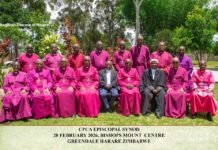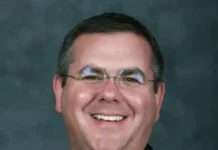As the new conservative evangelical ‘flying’ Bishop of Ebbsfleet launches off, the Bishop of Rochester’s written answer to a question from a General Synod member shines a light on the Church of England’s direction of travel.
Bishop Jonathan Gibbs, the CofE’s lead bishop on safeguarding, has responded to a question from Rebecca Hunt, a newly-elected Synod member for Portsmouth Diocese and a director of the Christian Legal Centre.
In November, in the long gap between last July’s General Synod meeting in York and the next session due in February, members were allowed to submit questions to bishops and senior officials for written answers. The questions and answers have just been published.
Mrs Hunt asked Bishop Gibbs: ‘What duties are clergy under, and what guidance is available on those duties, to ensure that where a member of the clergy preaches a sermon that expresses views on marriage in line with the doctrine of the Church of England, it does not give rise to any safeguarding concerns?’
As an advocate for traditional marriage, Mrs Hunt clearly does not believe that preaching it constitutes a safeguarding risk. But Synod rules on questions demand that they stick to factual matters and are not framed to elicit opinions, hence the rather opaque way in which she tried to find out whether Bishop Gibbs thought clergy would get into trouble for preaching the CofE’s current teaching on marriage.
Bishop Gibbs replied: ‘There is no duty or guidance that specifically deals with preaching a sermon on marriage. Canon B 18 (‘Of sermons in parish churches’) provides that the preacher “shall endeavour with care and sincerity to minister the word of truth, to the glory of God and to the edification of the people”.
‘Further, the Guidelines for the Professional Conduct of the Clergy (2015) set out at paragraph 12.2 that “In all forms of ministry, in leadership, teaching, preaching and presiding at worship, the clergy should resist all temptation to exercise power inappropriately. This power needs to be used to sustain others and harness their strengths, and not to abuse, bully, manipulate or denigrate.” Clergy at all times must have due regard to the House of Bishops’ policies on safeguarding children and vulnerable adults.’
On one level, Bishop Gibbs’s bureaucratic reply is par for the course in a Synod Q&A. But surely it is significant that he did not make clear that there should be no disciplinary consequences for clergy explaining the received biblical teaching of the Church on any matter? Arguably, Bishops Gibbs’s reply suggested that clergy preaching traditional marriage should be extremely cautious in expressing their view, otherwise they could fall foul of the Guidelines for the Professional Conduct of the Clergy.
Such then is the institution in which the Revd Dr Rob Munro has taken on the role of Bishop of Ebbsfleet, inheriting from his predecessor, Rod Thomas, the retired Bishop of Maidstone, delegated episcopal oversight of around 150 conservative evangelical parishes across England. Dr Munro, 59, has been Rector of St Mary’s Cheadle in Chester Diocese for 19 years. The Bishop of Peterborough, Donald Allister, was incumbent of that conservative evangelical parish church before he became Archdeacon of Chester in 2002.
February’s General Synod is when a decision is expected following the CofE’s Living in Love and Faith (LLF) consultation on marriage, gender and sexuality. Asked about his take on LLF at a press conference at All Souls Langham Place, the conservative evangelical flagship church in London’s Oxford Circus, Dr Munro told Premier Christian News:
‘There is a process underway that the Church has entered into with integrity. I’m not actually part of the conversations happening in the College of bishops. I will serve the Church as it seeks to find those answers.
‘But in the end, the Church of England is grounded in the Holy Scriptures and the Catholic Creed’s (sic in the report), and it would cease to be a Church if it moved beyond those foundations.’
Given his stated conviction on the spiritual foundations of the Church, the question clearly arises: what would Dr Munro do if the Church of England were to move away from those sure foundations by authorising a service of blessing for same-sex couples after civil marriage?
Joining the Gafcon-supported Anglican Convocation in Europe would seem to be the logical outcome of his stated conviction if he wished to serve as a senior pastor in the Anglican part of the Holy, Catholic and Apostolic Church.
But in the meantime, Dr Munro faces a more immediate dilemma: is he willing to accept delegated episcopal oversight from the Bishops of Oxford and Worcester who are pushing for same-sex marriage in the CofE and from the Bishop of Southwark who is advocating services of same-sex blessing?
Julian Mann is a former Church of England vicar, now an evangelical journalist based in the UK.



